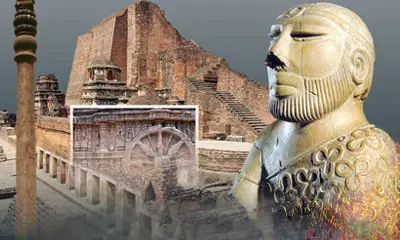Read the passage carefully and choose the best answer to each question out of the four alternative.
Click on the options to check whether it is right or wrong.
Nasiurddin was the cleverest man in Khorasan. One of his neighbours was a merchant. He was a great miser. One day the merchant saw Nasiurddin praying inside his house. He was praying in a loud voice asking God to be kind to him and send him 9999 dinars, not a dinar more, or a dinar less. If God sent him even one dinar more, he would return all the money. The merchant could not understand Nasiurddin’s prayer. He decided to find out the truth. He put 10,000 dinars in a bag and threw it into Nasiurddin’s house. Nasiurddin found the bag and counted the money carefully. He profusely thanked God for giving him 10,000 dinars, when he had asked for only 9999 dinars. The merchant heard Nasiurddin. He realized that Nasiurddin was going to keep the money. He went to Nasiurddin’s house. He called him a liar and demanded that his 10,000 dinars be returned to him. Nasiurddin refused. He claimed that he was not a fool to believe that anyone would throw away 10,000 dinars just to test someone’s honesty. It was his money given by God in answer to his prayer. The merchant decided to take the matter to the judge. Nasiurddin said that he had no clean clothes to wear. The merchant gave him some of his own clothes to wear. Then they went to see the judge.
The merchant told the judge what had happened. Nasiurddin argued that the merchant was mad. Ever since he lost a lot of money a few months back, he had been talking like a mad man. The judge asked Nasiurddin whether he could prove his charge. He said, “Just now he told you that I stole his money. Next he is going to tell you that these clothes which I am wearing are also his.” The merchant shouted angrily, “Of course, these clothes are mine!
The judge thought for a few minutes. Then he said, “The case is false. Nasiurddin has not stolen his neighbour’s money, the merchant is mad. He should be sent to a mental hospital.”
1. Nasiurddin was praying in a loud voice because
- He wanted to show that he was the cleverest man in Khorasan.
- He wanted to show that he was a holy man.
- He wanted his neighbour to hear his prayer
- He was in debts and hoped that God would answer his prayers.
2. The merchant threw the bag of money into Nasiurddin’s house because
- He was a miser
- He found Nasiurddin’s prayer interesting.
- He wanted to surprise Nasiurddin by helping him
- He wanted to catch Nasiurddin red-handed stealing the money.
3. When Nasiurddin found the bag of money he thought
- God had answered his prayer.
- Someone had been foolish enough to leave the money by mistake.
- His neighbour had thrown it into his house to help him.
- His neighbour had thrown it into his house to see what he would do.
4. The merchant called Nasiurddin a liar because
- Nasiurddin had claimed that the money belonged to him.
- Nasiurddin had said that the God sent him the money.
- Nasiurddin had said that he would return the money if it was not exactly 9999 dinars.
- Nasiurddin said that the merchant was a fool to throw 10,000 dinars into his house to test his honesty.
5. When the judge heard the case, he thought that the merchant
- was telling lies
- was mad
- was telling the truth, which he could not prove
- could be telling the truth
[1] [2] [3] [4] [5] [6] [7] [8] [9] [10] [11] [12] [13] [14] [15] [16] [17] [18] [19] [20] [21] [22] [23]
